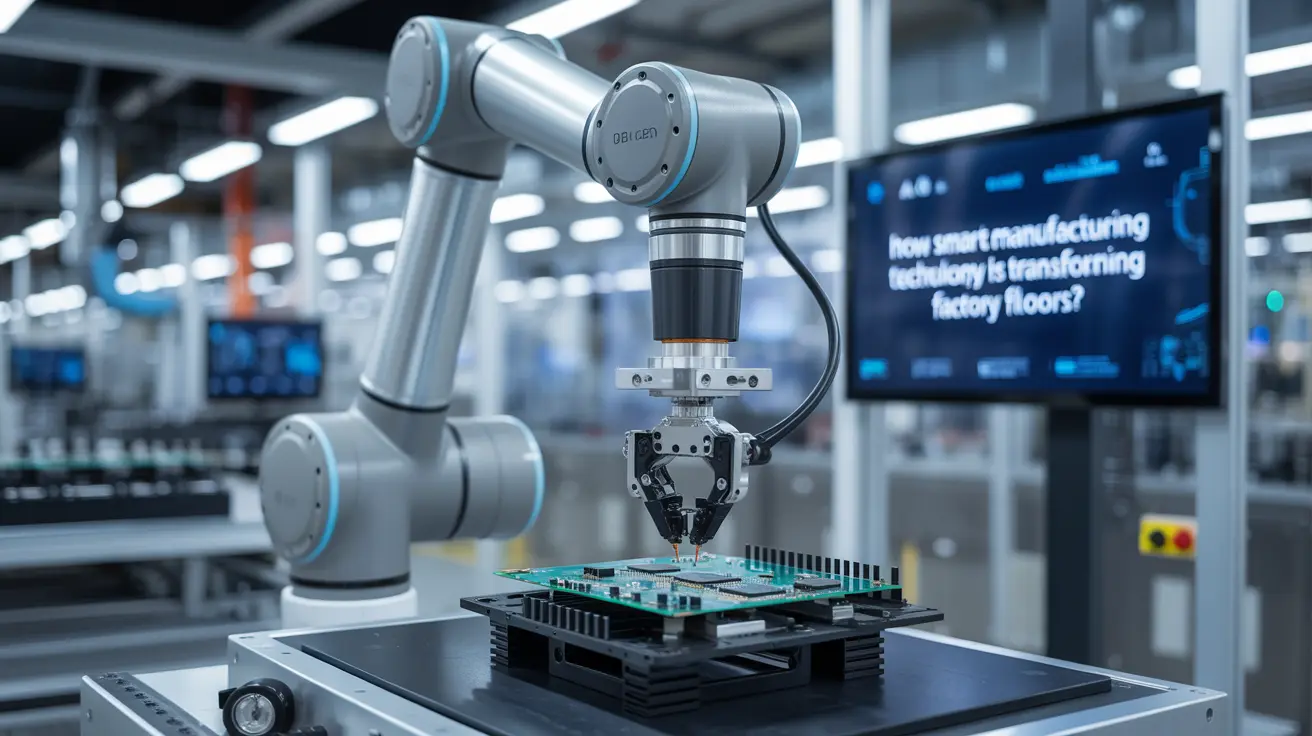Home / Blog / How Smart Manufacturing Technology Is Transforming Factory Floors?
Smart manufacturing technology is changing how factories operate from reducing downtime to improving productivity. Discover how AI, IoT, and automation are reshaping modern manufacturing with real-world examples and benefits.
1 Sep, 2025

Why Modern Manufacturing Needs a Smart Upgrade
Traditional factories can no longer keep up with today’s fast-moving demands. Downtime, human error, and inefficient workflows hurt productivity and profitability.
That’s where smart manufacturing technology steps in using AI, IoT, robotics, and real-time data to streamline processes and empower teams.
According to Deloitte, factories using smart technologies report up to 30% fewer breakdowns and 15% improvement in throughput.
In a competitive world, smart manufacturing isn’t just an upgrade it’s a necessity.
24/7 Visibility and Real-Time Monitoring
One of the biggest challenges for factories is not knowing when something will go wrong. Smart technologies provide real-time insights, so you’re not guessing you’re knowing.
Real-world example:
Siemens' Digital Factory in Amberg, Germany uses sensors and automation to monitor over 50 million components daily. Machines communicate with each other, adjust automatically, and alert engineers before issues arise.
The result?
Near-zero downtime and 99.99885% product quality.
(Source: Siemens)
AI-Powered Predictive Maintenance
Smart manufacturing means using AI to predict problems before they happen. Instead of waiting for a machine to break, predictive systems alert teams early saving time and money.
Real-world example:
GE Aviation
uses AI and machine learning to monitor engine part wear. Predictive insights
have cut maintenance delays and improved fleet uptime dramatically.
(Source: GE Digital)
Factories
using predictive maintenance save up to 12% on repair costs and experience 30%
less equipment failure.
(Source: McKinsey)
Personalized Production Through Automation
Gone are the days of one-size-fits-all production. With smart robotics and automation, factories can customize output based on real-time demand.
Real-world example:
Bosch implemented AI-driven automation to switch between different product lines without manual input. The system adjusts settings, loads the right materials, and starts production automatically.
This flexibility lets manufacturers offer faster, more customized service without increasing costs.
Freeing Up Human Talent for High-Value Work
Smart factories don’t replace people they free them from repetitive tasks so they can focus on creativity, strategy, and innovation.
Tasks like quality checks, data entry, and inventory management are now handled by smart systems. Workers are upskilled and moved to higher-value roles, boosting morale and long-term growth.
72% of
manufacturers say automation has increased worker satisfaction, not reduced
jobs.
(Source: World Economic Forum)
Building Trust Through Data-Driven Operations
Smart manufacturing runs on data and that means more transparency, traceability, and consistency.
From raw materials to delivery, every step is tracked. This allows manufacturers to meet safety standards, comply with regulations, and offer full transparency to customers and stakeholders.
Real-world example:
Ford's smart
factories use blockchain and IoT to track parts from source to showroom,
reducing counterfeiting and increasing customer trust.
(Source: Ford Motor Company)
Driving Long-Term Growth and Agility
The true power of smart manufacturing lies in scalability and resilience. Factories can adapt faster, test changes virtually with digital twins, and make better decisions using AI analytics.
Companies investing in smart manufacturing tech report 10-20% faster go-to-market times and higher customer satisfaction scores.
In an uncertain global economy, agility is your competitive edge.
Conclusion: The Future of Manufacturing Is Smart, Scalable, and Human-Centered
Smart manufacturing technology is not about replacing workers it’s about empowering teams, boosting efficiency, and building resilient, future-proof operations.
Whether it’s real-time monitoring, predictive maintenance, or AI-driven automation, these tools are reshaping how we think about production.
Smart factories are already delivering better products, faster timelines, and happier teams. The question isn’t if you should adopt them it’s when.
Ready to Build Your Smart Factory?
Smart manufacturing isn’t a futuristic concept it’s happening now. If your factory is still relying on outdated systems, it’s time to modernize.
At 10turtle, we specialize in building custom tech solutions that bring smart manufacturing to life. From AI integration to end-to-end automation strategies, we help manufacturers turn their floors into intelligent, scalable, and efficient powerhouses.
Let’s build your smart manufacturing system book
your free consultation today.